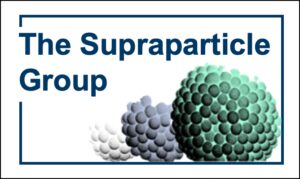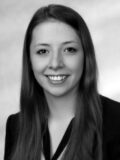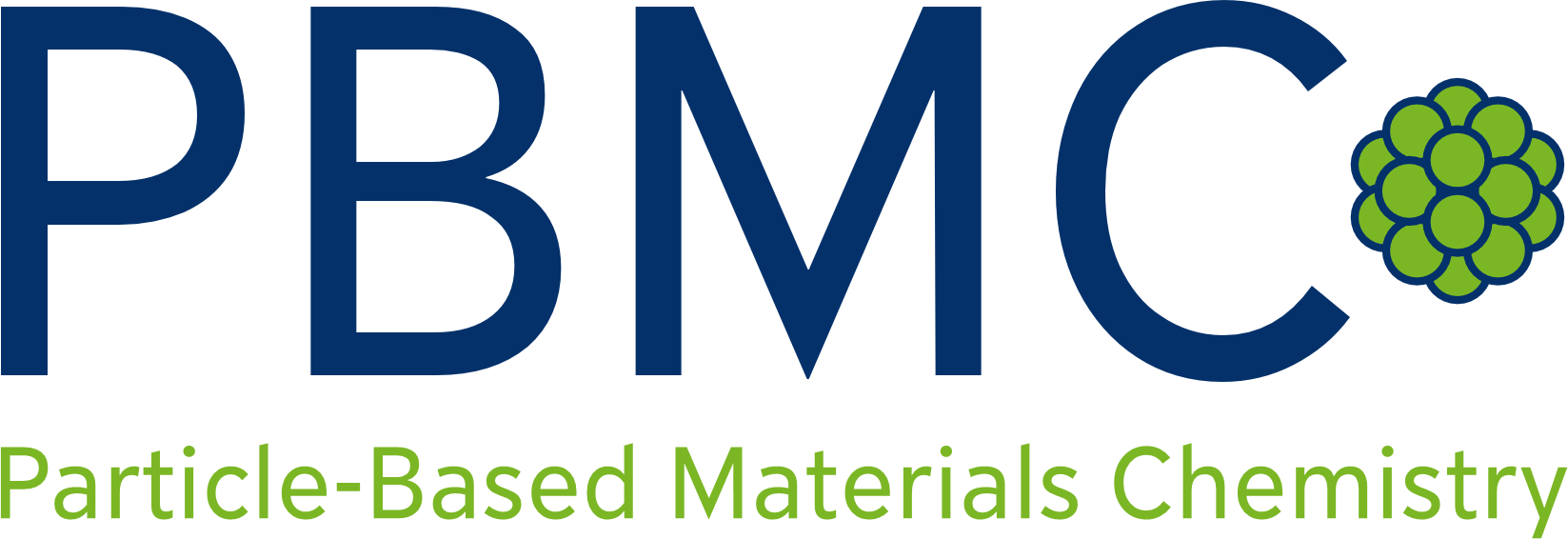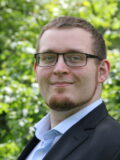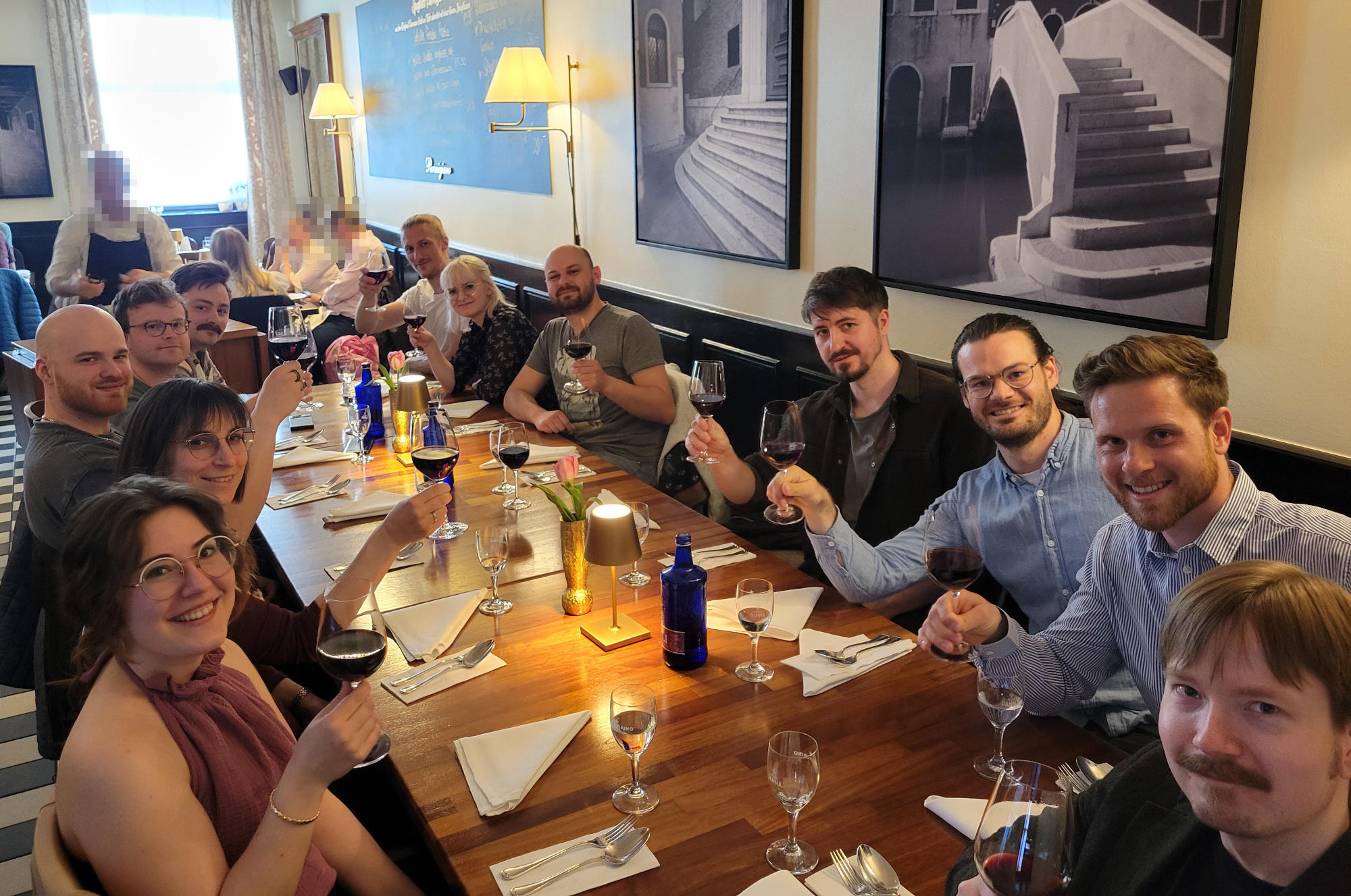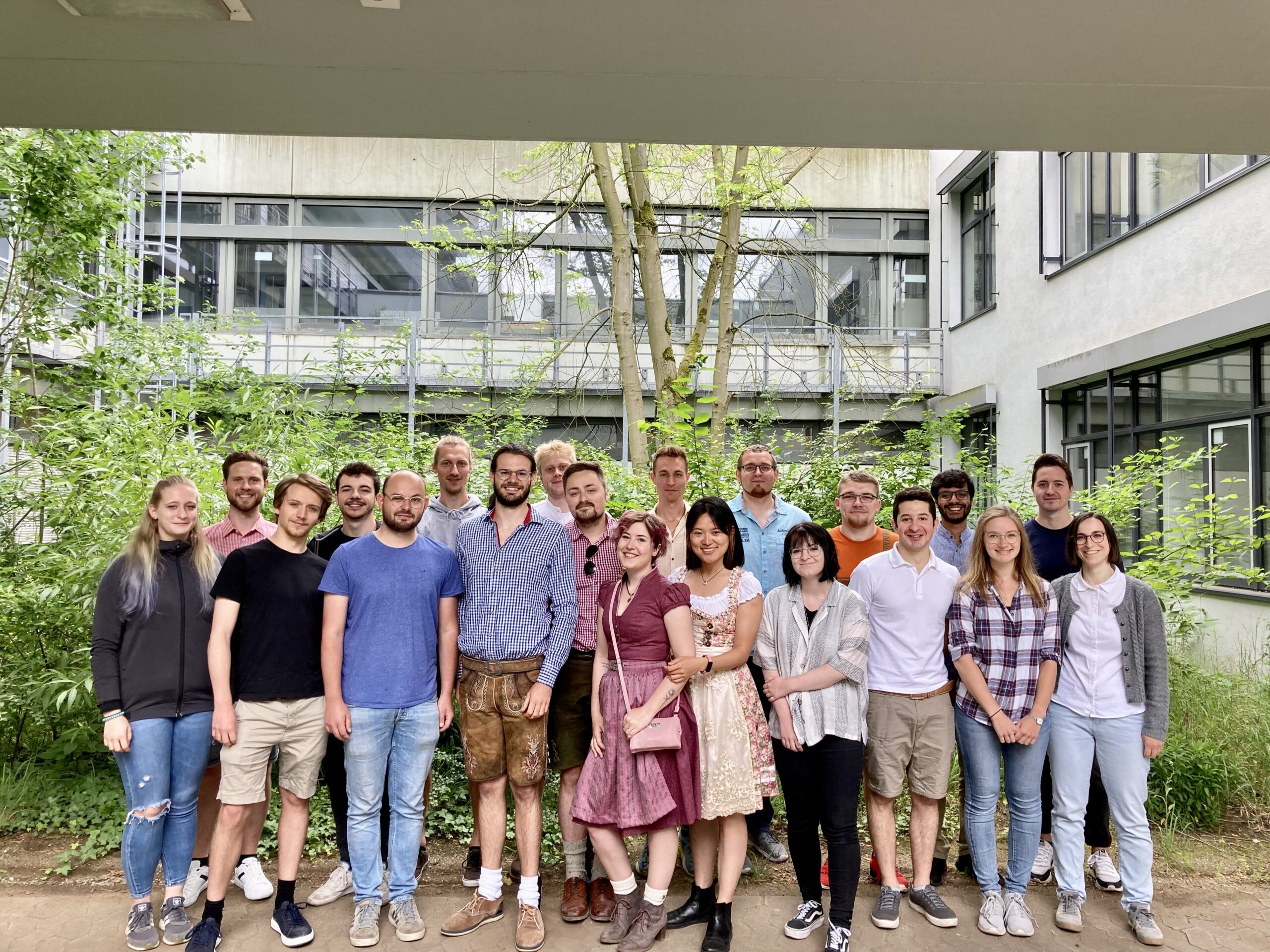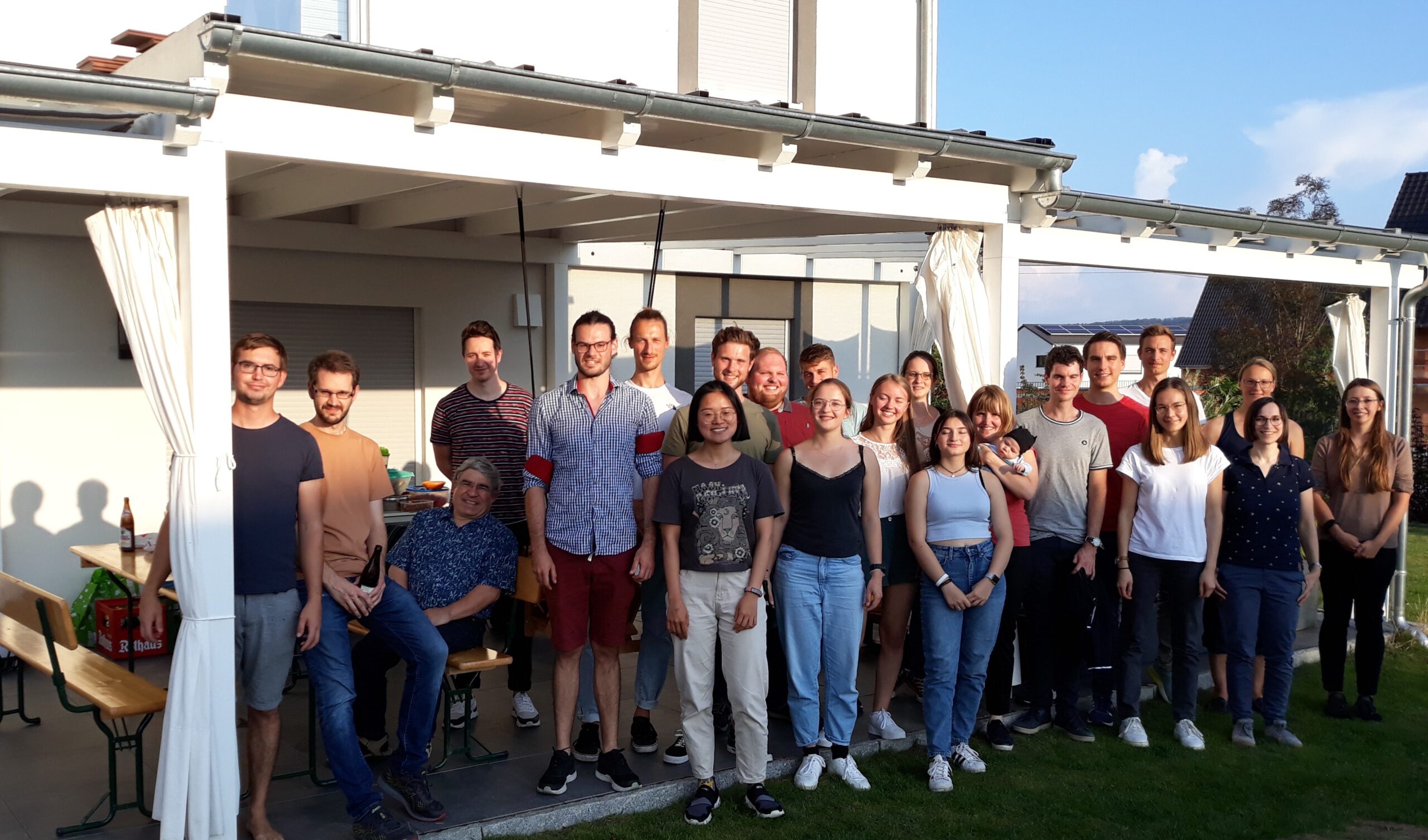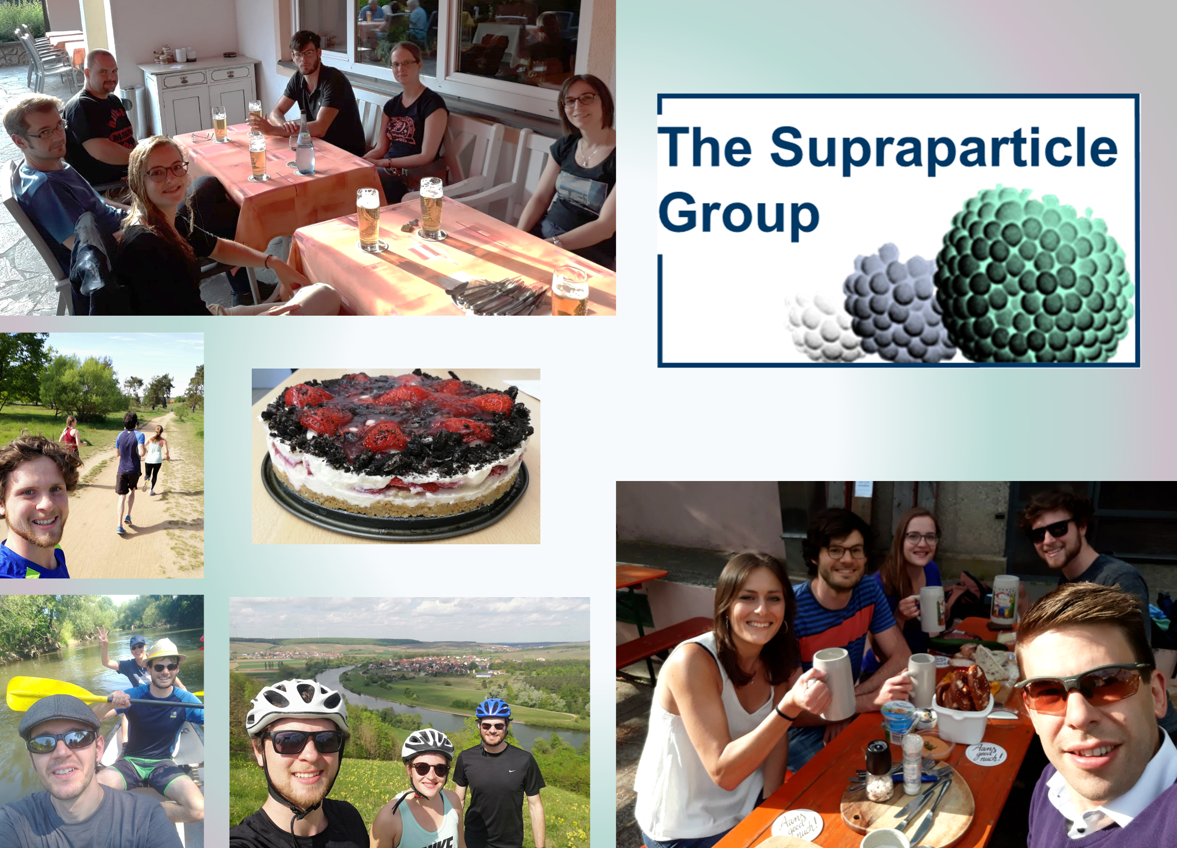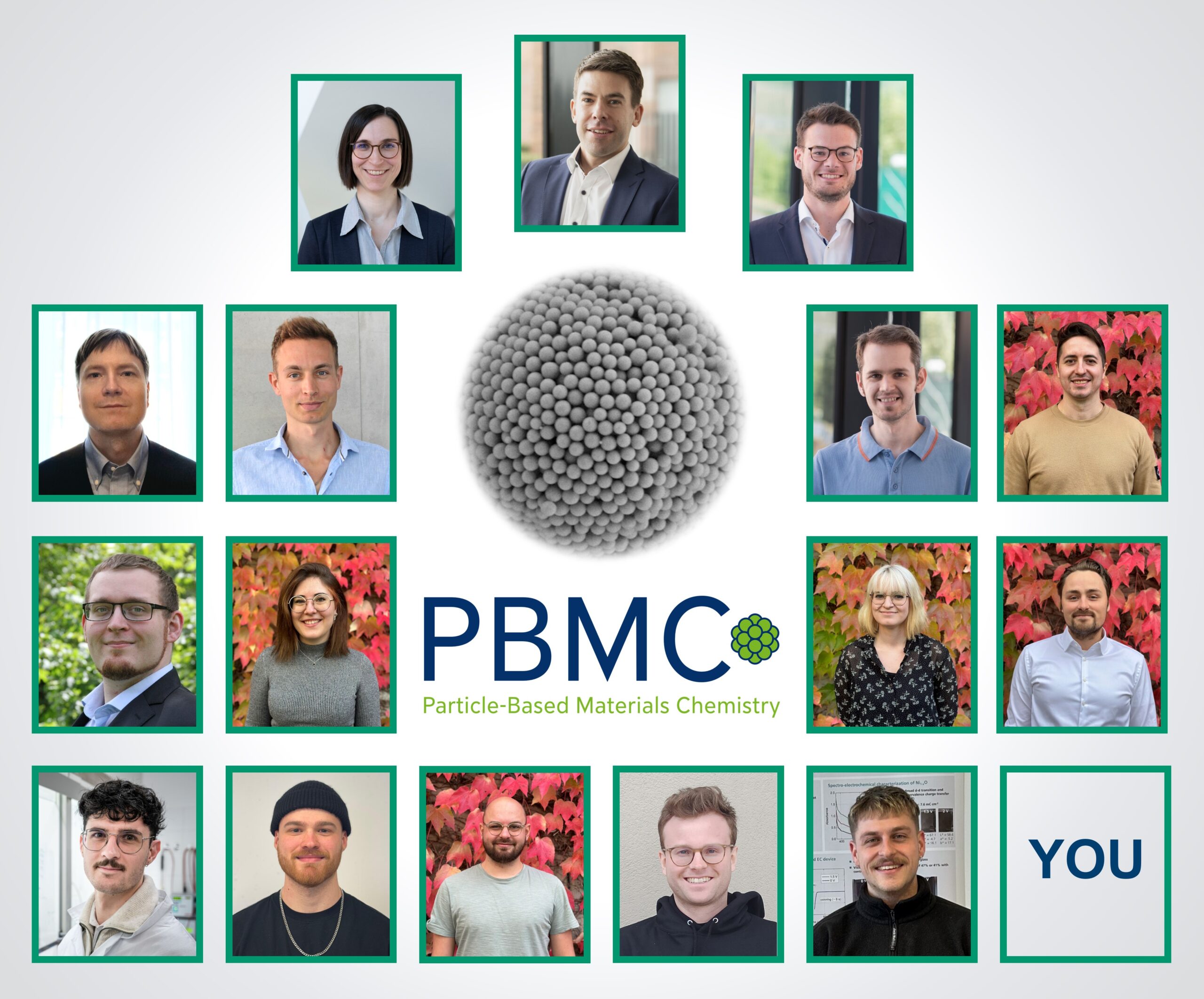Index
Laura Bittel
Professorship for
Inorganic Chemistry
The Supraparticle Group
Laura Bittel
Laura Bittel graduated from Friedrich Alexander University with a Master of Science degree in Chemical and Bioengineering in May 2021. During her bachelor’s degree in process and environmental engineering at Heilbronn University of Applied Sciences, she completed internships at adidas AG and Deutsche ACCUmotive GmbH & Co. KG. She performed her bachelor’s thesis at Daimler AG in battery research with a focus on life cycle simulation.
After she finished her Master’s thesis at the Fraunhofer Institute in Würzburg in the group of Prof. Dr. Mandel, she started her PhD within the group. Her research focuses on multicomponent catalytic supraparticles.
Theodor Raczka
Chair of Particle-Based Materials Chemistry (PBMC)
Theodor Raczka
Theodor Raczka graduated from Friedrich-Alexander University Erlangen-Nürnberg with a Master of Science degree in chemistry in 2021. During his master’s thesis he focused on the synthesis, modification and characterisation of magnetic nanoparticles, as well as on the development of an induction heating device and method to evaluate their potential as hyperthermia agents in cancer therapies.
He started his PhD position in April 2021 in Würzburg at the Fraunhofer ISC and in Erlangen at the FAU with a focus on the design of magnetic particle architectures with inductively triggerable functionalities.
Publications:
No publications found.
Andreas Wolf
Chair of Particle-Based Materials Chemistry (PBMC)
Andreas Wolf
Andreas Wolf graduated from the Julius Maximilian University Wuerzburg in 2020 with a Master of Science degree in Functional Materials. Experiences in industry and abroad include one year at the University of New Mexico (2016-2017) as well as internships at the BMW Group (2018-2019, department for adhesives) and the Norwegian Institute for Energy Technology (2020, silicon anodes). He has been a research assistant at the Fraunhofer Institute for Silicate Research since 2014 and contributed to different projects in the field of lithium-ion batteries and particle technologies.
In his PhD thesis he focuses on interactive magnetic supraparticles in dynamic fluidic environments and their application as smart sensors in water purification and battery recycling processes. A key to his research is the innovative use of magnetic particle spectroscopy for live-analysis of magnetic nanoparticle relaxation phenomena.
Publications:
2025
- , , , , , , , , , :
NanoMOF‐Based Multilevel Anti‐Counterfeiting by a Combination of Visible and Invisible Photoluminescence and Conductivity
In: Advanced Functional Materials (2025)
ISSN: 1616-301X
DOI: 10.1002/adfm.202500794 - , , , , :
Bulk Magnetic Properties Arise from Micron‐Sized Supraparticle Interactions and Can be Modified on the Nanoscale
In: Small (2025)
ISSN: 1613-6829
DOI: 10.1002/smll.202412311
2024
- , , , , , , :
Influence of magnetic interactions in iron oxide nanoparticle polymer composites on magnetism and induction heating
In: Journal of Magnetism and Magnetic Materials 598 (2024), Article No.: 172042
ISSN: 0304-8853
DOI: 10.1016/j.jmmm.2024.172042 - , , , , , , :
Circular battery design: investing in sustainability and profitability
In: Energy and Environmental Science (2024)
ISSN: 1754-5692
DOI: 10.1039/d4ee03418j - , , , , :
Magnetic Supraparticles Capable of Recording High‐Temperature Events
In: Advanced Functional Materials (2024)
ISSN: 1616-301X
DOI: 10.1002/adfm.202316212 - , , , , , , , , :
Nanoparticle Clustering in Supraparticles to Control Magnetic Long-Range Interactions
In: Particle & Particle Systems Characterization (2024), Article No.: 2400180
ISSN: 0934-0866
DOI: 10.1002/ppsc.202400180
2023
- , , , , , , , , , :
Magnetic in situ determination of surface coordination motifs by utilizing the degree of particle agglomeration
In: Journal of Colloid and Interface Science (2023), p. 633-643
ISSN: 0021-9797
DOI: 10.1016/j.jcis.2023.05.182
2022
- , , , , , , , , , , , , , , , , , , , , , , , , , , , , , , , , , , , , , , , , , , , , , , , , :
A Roadmap for Transforming Research to Invent the Batteries of the Future Designed within the European Large Scale Research Initiative BATTERY 2030+
In: Advanced Energy Materials (2022), Article No.: ARTN 2102785
ISSN: 1614-6832
DOI: 10.1002/aenm.202102785
2021
- , , , , , , , , , , :
Supraparticles for Sustainability
In: Advanced Functional Materials (2021)
ISSN: 1616-301X
DOI: 10.1002/adfm.202011089 - , , , , , , , , , , :
Centrifugation based separation of lithium iron phosphate (LFP) and carbon black for lithium-ion battery recycling
In: Chemical Engineering and Processing 160 (2021), Article No.: 108310
ISSN: 0255-2701
DOI: 10.1016/j.cep.2021.108310 - , , , , , , :
Abrasive blasting of lithium metal surfaces yields clean and 3D structured lithium metal anodes with superior properties
In: Energy Technology (2021), Article No.: ente.202100455
ISSN: 2194-4288
DOI: 10.1002/ente.202100455
2020
- , , , , , , :
Investigation of Centrifugal Fractionation with Time-Dependent Process Parameters as a New Approach Contributing to the Direct Recycling of Lithium-Ion Battery Components
In: Metals 10 (2020), Article No.: 1617
ISSN: 2075-4701
DOI: 10.3390/met10121617
Thomas Zimmermann
Chair of Particle-Based Materials Chemistry (PBMC)
Thomas Zimmermann
Thomas Zimmermann finished his apprenticeship as a paint laboratory technician at Eckart GmbH in 2011 and then worked there in the field of graphic arts in the R&D and application technology for two years. After that, he went to the TBS1 in Bochum and graduated from there as a state-certified technical engineer in the field of Chemistry in 2015. In the same year, he started his academic studies in the same field. During his Master studies he worked in the group of Ian Manners at the University of Victoria, BC, Canada. Thomas graduated from the University of Wuerzburg with a Master degree in Chemistry in 2020. His Master’s Thesis theme was to create silicone based fine dust catching coatings and methods for their testing. He started his doctoral position in January 2021 in Wuerzburg at the Fraunhofer ISC and in Erlangen at the FAU with focus on particle based coatings for targeted influence of aerosol-surface interaction.
Publications:
2025
- , , , , , , :
Enhanced self-cleaning performance on hydrophobic glass surfaces using hydrophilic dagger features coated with silica nanoparticles
In: Solar Energy Materials and Solar Cells 282 (2025), p. 113366
ISSN: 0927-0248
DOI: 10.1016/j.solmat.2024.113366 - , , , , , , , , :
Key Role of Binders to Anchor Nanoparticle-Based Supraparticles on Spherical Substrates with Preserved Functionality
In: ACS Applied Nano Materials 8 (2025), p. 4087−4099
ISSN: 2574-0970
DOI: 10.1021/acsanm.4c07051
2024
- , , , , , , , , , :
Inductively heatable catalytic materials for the dehydrogenation of the liquid organic hydrogen carrier (LOHC) perhydro dibenzyltoluene
In: Catalysis: Science and Technology 14 (2024), p. 4450-4457
ISSN: 2044-4753
DOI: 10.1039/d4cy00272e - , , , , , , , , , :
Assembly of Zinc‐Single‐Site‐Containing Silica Nanoparticles to Supraparticle Powders with Destructibility to Serve as Filler and Vulcanization Activator in Rubbers
In: Particle & Particle Systems Characterization (2024)
ISSN: 0934-0866
DOI: 10.1002/ppsc.202300161 - , , , , :
Influence of cation concentration and valence on the structure and texture of spray-dried supraparticles from colloidal silica dispersions
In: Journal of Colloid and Interface Science 658 (2024), p. 199-208
ISSN: 0021-9797
DOI: 10.1016/j.jcis.2023.12.051 - , , , , , :
Nature-Inspired Regenerative Fine-Dust-Catching Coatings to Improve Air Quality
In: ACS Applied Materials and Interfaces (2024)
ISSN: 1944-8244
DOI: 10.1021/acsami.3c19074 - , , , , , , , , , , :
Sol-gel coatings for solar cover glass: Influence of surface structure on dust accumulation and removal
In: Solar Energy 267 (2024), Article No.: 112246
ISSN: 0038-092X
DOI: 10.1016/j.solener.2023.112246
2023
- , , , , , , , :
Mechanical Stability of Liquid-Infused Surfaces Based on Mussel-Inspired Polydopamine Chemistry
In: Macromolecular Materials and Engineering (2023), Article No.: 2300191
ISSN: 1439-2054
DOI: 10.1002/mame.202300191 - , , , , , , , , , , , , :
Supraparticles on beads for supported catalytically active liquid metal solutions - the SCALMS suprabead concept
In: Materials Horizons (2023)
ISSN: 2051-6347
DOI: 10.1039/d3mh01020a
Huanhuan Zhou
Professorship for
Inorganic Chemistry
The Supraparticle Group
We could not find any entry with the given search term 188386.
Publications:
2024
- , , , , , , , , :
Nanoparticle Clustering in Supraparticles to Control Magnetic Long-Range Interactions
In: Particle & Particle Systems Characterization (2024), Article No.: 2400180
ISSN: 0934-0866
DOI: 10.1002/ppsc.202400180 - , , , , :
Influence of cation concentration and valence on the structure and texture of spray-dried supraparticles from colloidal silica dispersions
In: Journal of Colloid and Interface Science 658 (2024), p. 199-208
ISSN: 0021-9797
DOI: 10.1016/j.jcis.2023.12.051 - , , , , :
One-step fabrication of platelet-shaped Janus supraparticles via spray-drying
In: Powder Technology 440 (2024), Article No.: 119756
ISSN: 0032-5910
DOI: 10.1016/j.powtec.2024.119756
2022
- , , , , :
Tuning the Morphology of Spray-Dried Supraparticles: Effects of Building Block Size and Concentration
In: Particle & Particle Systems Characterization (2022)
ISSN: 0934-0866
DOI: 10.1002/ppsc.202200127
2021
- , , , , , , , , , , :
Supraparticles for Sustainability
In: Advanced Functional Materials (2021)
ISSN: 1616-301X
DOI: 10.1002/adfm.202011089 - , , , , , , :
Self-discharge of supercapacitors based on carbon nanosheets with different pore structures
In: Electrochimica Acta 390 (2021)
ISSN: 0013-4686
DOI: 10.1016/j.electacta.2021.138783
2020
- , , , , , , , :
Self-discharge of supercapacitors based on carbon nanotubes with different diameters
In: Electrochimica Acta 357 (2020), p. 136855
ISSN: 0013-4686
DOI: 10.1016/j.electacta.2020.136855 - , , , :
Li4Ti5O12−TiO2 Composite Coated on Carbon Foam as Anode Material for Lithium Ion Capacitors: Evaluation of Rate Performance and Self-Discharge
In: ChemNanoMat 6 (2020), p. 280-284
ISSN: 2199-692X
DOI: 10.1002/cnma.201900682
Group Activities
Group activities
Besides science, we also like to do things together in our free time. Whether it is the coffee in the morning, cake party, cooking and having barbecues together or sports activities – there are plenty of things we enjoy doing together as a group on a regular basis. Please, have a look at some of our activities.
Celebrating the Promotion of our Group to an own Chair
The Mandel group’s Christmas party is in the books. Plenty of quiz questions were answered, Glühwein consumed and secret santa gifts unwrapped.
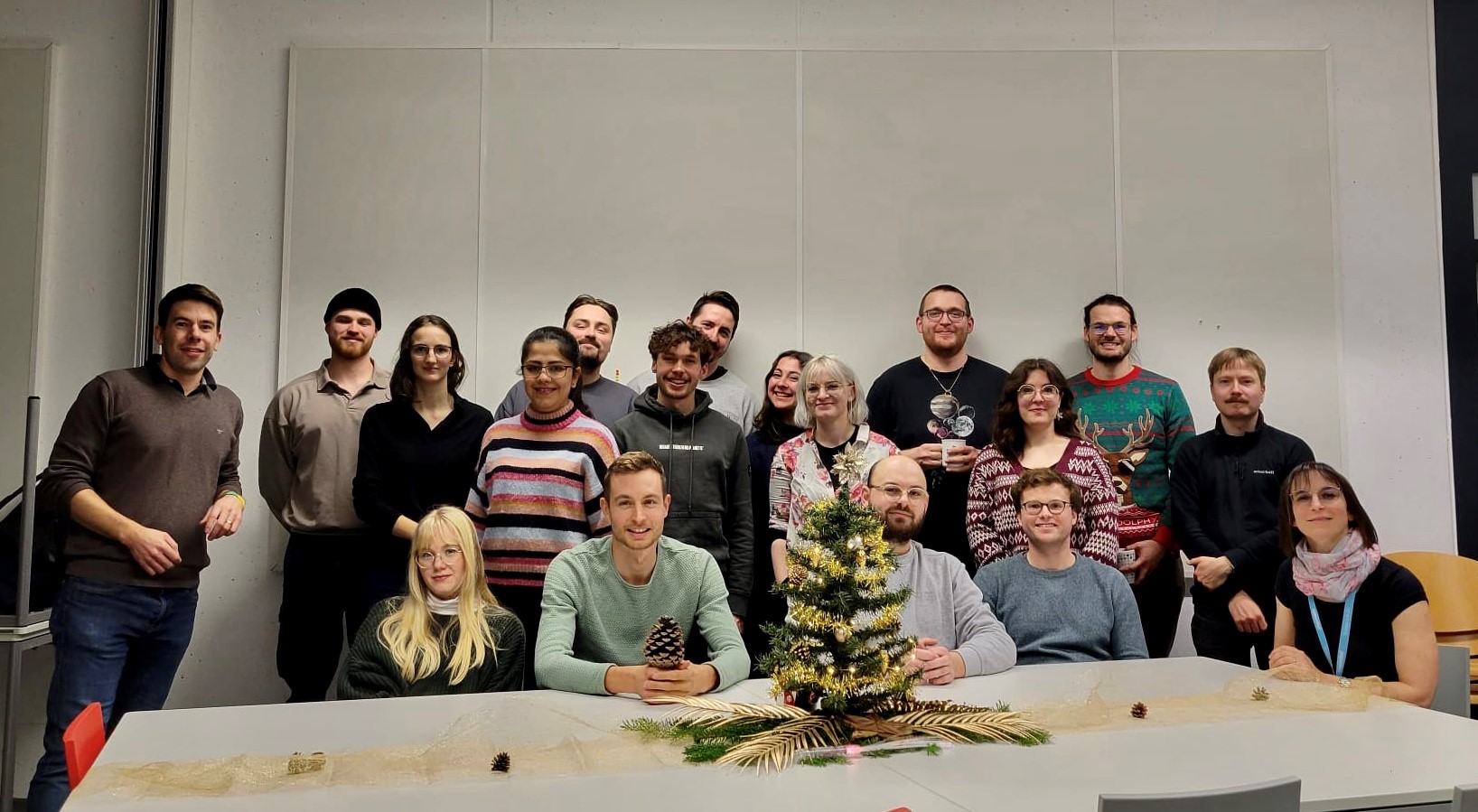
Mandel group and Particle Technology Group from The Fraunhofer ISC joined for our common Retreat. This year we went to Pottenstein and found time for hiking, Spike Ball, Badminton and plenty of good food and drinks.
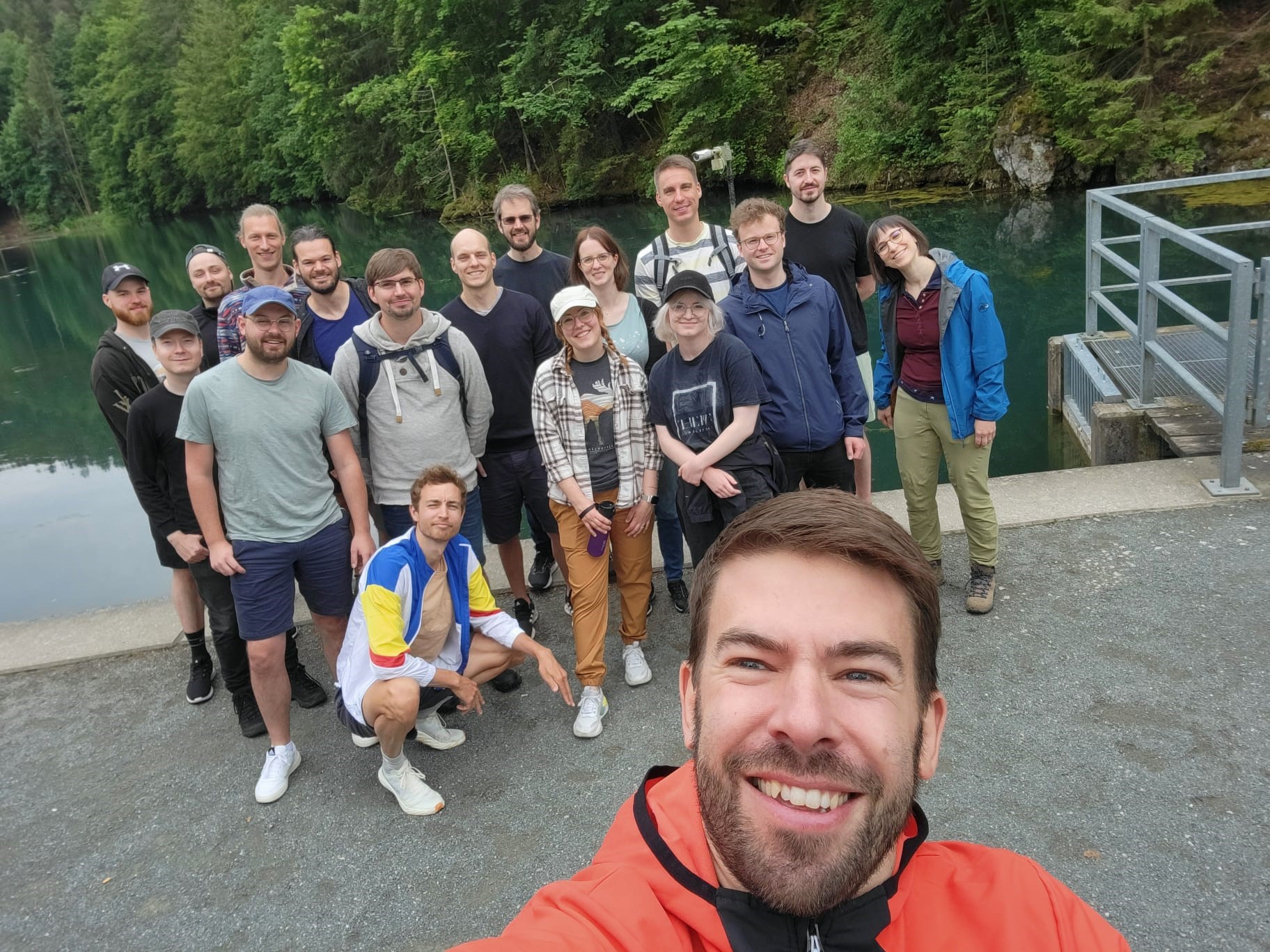
As tradition demands it, the Mandel group followed the invitation of the Chair of Inorganic Chemistry to the Bergkirchweih. After a traditional Weißwurst-Frühstück at the university, we enjoyed the walk to the Berg and joined the other Groups at the Tucher Keller.
The Mandel group goes Bowling
FAU and ISC Groups coming together for a BBQ
Multifunctional catalysts
Research
Multifunctional catalysts
![]()
Supraparticles can provide an emergent, tunable porosity and precisely configurable accessibility of active catalyst sites, thus, enhanced catalytic activity and stability. Their flexible setup also permits the integration of multiple different building blocks, which allows for coupling interactions within the material, e.g., energy transfers, or the addition of further functionalities such as an inductive heatability of the systems. For the direct application of supraparticles in catalytic fixed-bed reactors, their attachment on beads, yielding ‘suprabeads’, is a strategy to increase their size regime without compromising their unique supraparticle-based functionality.
Selected publications:
, Müller V., Will J., Zhou X., Zhang K., Moritz M.S. , Papp C., Libuda J., Retzer T., Spiecker E., Bachmann J., , Wintzheimer S.
Atomic Layer Deposition on Spray-dried Supraparticles to Rationally Design Catalysts with Ultralow Noble Metal Loadings
In: Chemistry of Materials (2025)
DOI: 10.1021/acs.chemmater.4c03429
Gryn S, Kurmach M., Yaremov P., Shvets O., Alekseev S., Wintzheimer S.,
Design of hierarchical TS-1 zeolites using spray-drying for enhanced catalytic activity in cyclic carbonate formation
In: Microporous and Mesoporous Materials (2025)
DOI: 10.1016/j.micromeso.2025.113610
Catalyst Supraparticles: Tuning the Structure of Spray-dried Pt/SiO2 Supraparticles via Salt-based Colloidal Manipulation to Control their Catalytic Performance
In: Small (2024)
DOI: 10.1002/smll.202310813
Supraparticles on beads for supported catalytically active liquid metal solutions – the SCALMS suprabead concept
In: Materials Horizons (2023)
DOI: 10.1039/D3MH01020A
Schötz S., Stockinger N., Libuda J.,
Molecular and structural insights into H2 indicator supraparticles: lowering the limit of detection by tuning incorporated catalyst nanoparticles
In: Chemistry of Materials (2023)
DOI: 10.1021/acs.chemmater.3c01105
Contact | How to reach us
Contact
How to reach us
By email:
particlechem@fau.de
By car:
Egerlandstraße 1 91058 Erlangen.
Parking on both sides of the street is allowed but busy during working hours.
Alternatively: contact secretary Marion Retter and ask for help.
By public transport:
Leave the train station in the direction of “Stadtzentrum” (city center).
Take the bus line 287 (Sebaldussiedlung) from “Erlangen, Hauptbahnhof” to
“Erlangen, Technische Fakultät”. From there you can reach “Egerlandstraße 1“ in approximately 3 min by foot.
For information in detail, please visit VGN (Verkehrsverbund Großraum Nürnberg GmbH).
Institute for Inorganic and General Chemistry II
Department of Chemistry and Pharmacy
Chair of Particle-Based Materials Chemistry (PBMC)
Egerlandstraße 1
91058 Erlangen
2nd floor
Rooms
Prof. Karl Mandel / Dr. Susanne Wintzheimer: A2.20
Postdocs: A0.40
PhD Candidates: A2.08
Labs: A2.41 / A2.42
Secretary
Equipment
Equipment
Material Processing
- Büchi Spray-dryers (2x)
- Furnaces
- Centrifuge
- Rotary evaporator
- Diverse ultrasonic units
- Microwave
- Induction heater
Material characterization
- Field-emission scanning electron microscopy (shared with the Bachmann Group): Jeol JSM-F100 with EDX, low-pressure operation mode, STEM, and sample plasma cleaner.
- Magnetic particle spectroscopy
- Fluorescence spectrometer
- Gas sorption analyzer
- Dynamic light scattering
- Climate chamber
We furthermore have access to the great arsenal of equipment of the Meyer, the Bachmann and the Vogel group (see LINKS) including a SQUID magnetometer and powder XRD. The colleagues are gratefully acknowledged for granting us access.
Open positions
Open Positions
We are always looking for dedicated students who would like to do a BSc or MSc thesis or work as an intern. PhD positions are available occasionally as well.
For detailed information on our topics of research please visit the Research or Publications section on our website.
Interested? Please contact: karl.mandel@fau.de or stephan.muessig@fau.de.

